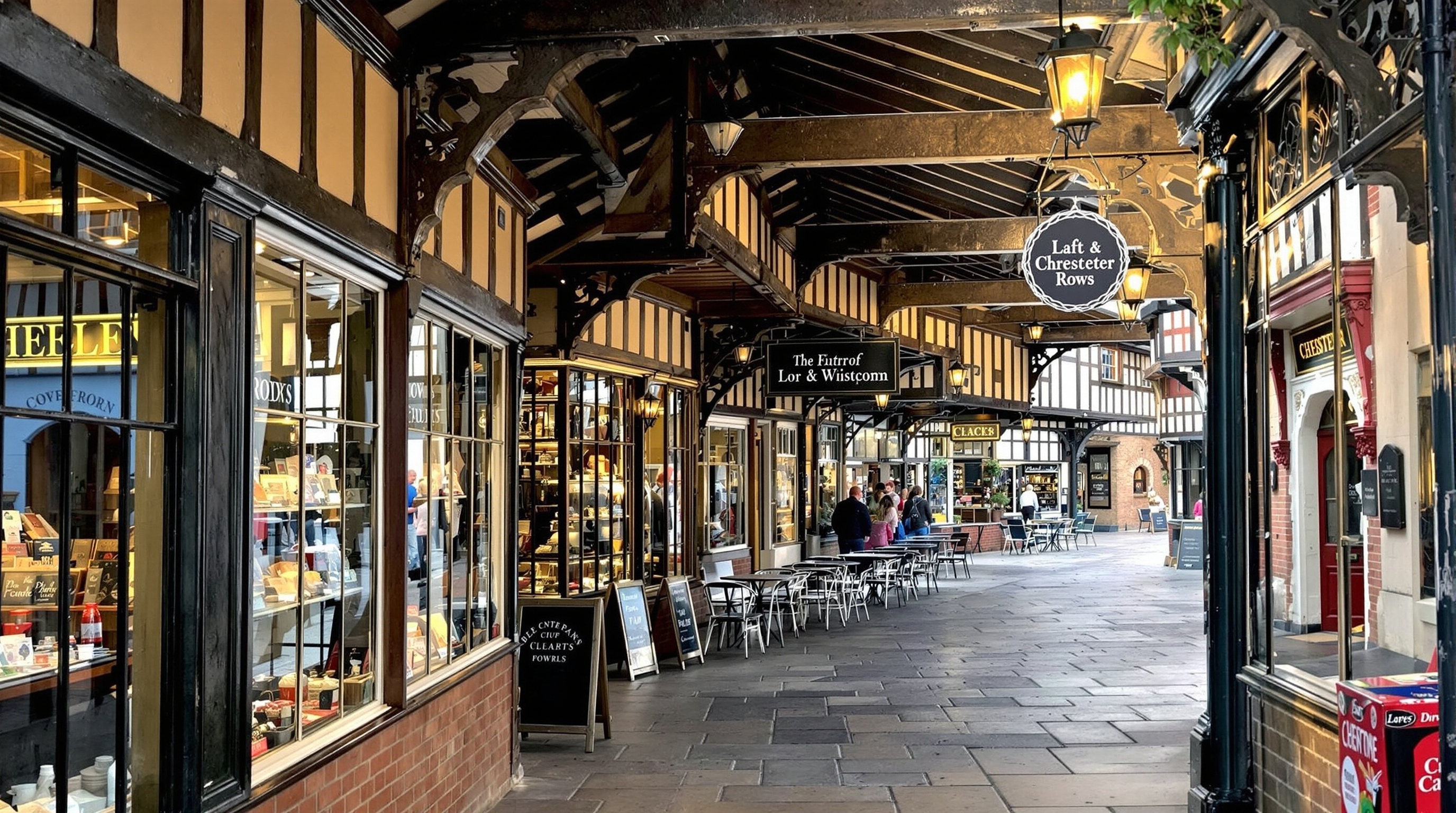
Is Chester a Nice Place to Live? A 2025 Reality Check
Named the UK's most welcoming city and ranked 6th overall, but with higher costs and limited metro access. Here's the full picture.
Chester ranks as the UK's most welcoming city according to Booking.com research and placed 6th in the Sunday Times Best Places to Live 2024. These accolades reflect genuine advantages including Roman heritage, excellent schools, cultural venues, and strong transport links across the North West.
However, Chester's desirability creates challenges. Property prices average £255,000 compared to lower northern averages, employment sectors concentrate in retail and hospitality rather than diverse high-paying industries, and the city lacks metro connectivity despite good regional rail links. Understanding both positives and negatives provides realistic expectations for potential residents.
The Positives: Why Chester Scores Highly

Chester's 2,000-year history creates unique character impossible to replicate. The complete circuit of Roman walls, medieval Rows shopping galleries, and cathedral combine heritage assets that define the city's identity and attract 16.6 million annual visitors.
This heritage translates to architectural beauty in daily life. Residents walk medieval streets, shop in Victorian arcades, and socialise in historic pubs. This environment offers aesthetic and cultural richness beyond standard British cities.
Education provision ranks exceptionally high, with multiple outstanding-rated primary schools and The King's School and Queen's School among Britain's leading independent schools. Sixth form colleges and the University of Chester campus provide further education options.
Cultural and social life benefits from professional theatre (Storyhouse), numerous restaurants (382 in total, including 13 Michelin Guide listings), festivals, and sports clubs. The city supports varied interests from rowing on the Dee to amateur dramatics and heritage societies.
Employment and Economic Considerations
Chester's economy centres on retail, hospitality, and tourism driven by visitor numbers. Whilst this creates abundant service sector jobs, it limits opportunities in technology, finance, manufacturing, or professional services paying higher salaries.
The average Chester salary of £42,400 sits above UK median but below major northern cities like Manchester and Leeds. This figure masks considerable variation, with high earners in professional roles balanced by many in lower-paid retail and hospitality positions.
Commuting to Liverpool, Manchester, or Warrington becomes necessary for many professional careers. Good rail links make this practical, but commuting costs and time affect quality of life and net income.
Some sectors offer strong Chester opportunities, particularly public sector roles in healthcare, education, and local government. The Countess of Chester Hospital, council offices, and schools employ thousands in relatively stable, decent-paying positions.
Business start-ups benefit from lower costs than Manchester whilst maintaining reasonable transport access. The small business community supports entrepreneurs, though the relatively small population limits local market size for many ventures.
Property Market and Housing Costs
Property prices average £255,000, considerably above northern England norms though below southern levels. This positions Chester in the 'affordable for professionals but challenging for others' category.
Different areas show substantial variation. Sought-after suburbs like Hoole and Upton command premiums, whilst outer estates and former council housing offer more affordable entry points. School catchments significantly influence neighbourhood pricing.
The rental market serves students, young professionals, and families, with city centre flats, suburban houses, and village properties all available. Rents reflect purchase prices, meaning housing costs take substantial income portions across tenure types.
First-time buyers face challenges accumulating deposits whilst renting, particularly those in lower-paid service sector jobs. Help to Buy and shared ownership schemes assist some, but property affordability remains a genuine barrier for many.
The heritage city status limits new building within historic areas, constraining housing supply. Developments concentrate on urban fringes and surrounding villages, affecting commute times and access to city amenities.
Transport and Connectivity
Chester railway station offers regular services to Liverpool, Manchester, Birmingham, and North Wales. This connectivity enables commuting and leisure travel without car dependence for intercity journeys.
However, Chester lacks metro or tram systems found in major conurbations. The city relies on buses for public transport, with services generally adequate for main routes but limited in evenings, Sundays, and to some suburbs.
Car ownership remains high, particularly for families and those working outside the city. Parking costs and traffic congestion affect city centre access, though less severely than larger cities.
Cycling infrastructure has improved but still lags behind leading British cities. The Greenway network provides leisure routes, but commuting by bike requires navigating busy roads in many areas. The flat terrain helps, as do increasing numbers of cycle lanes.
The M53 and M56 motorways place Chester within an hour of Manchester Airport, Liverpool docks, and major population centres. This regional position benefits both business and leisure travel whilst avoiding the intensity of living in conurbation cores.
The Downsides and Challenges
Tourism's benefits come with costs. Summer crowds fill the city centre, with coach parties and school groups creating congestion and noise. Some residents avoid the centre entirely during peak visitor season.
The heritage status that creates charm also restricts modifications. Listed building regulations, conservation area rules, and planning restrictions limit what property owners can do. This preserves character but frustrates those wanting modern alterations.
Entertainment options beyond pubs and restaurants remain limited compared to major cities. Live music venues, clubs, and alternative culture exist but in smaller scale. Those seeking diverse nightlife often travel to Liverpool or Manchester.
The small city size means limited anonymity and recurring encounters with the same people. This suits those valuing community but can feel constraining for those preferring urban anonymity.
Weather follows typical North West patterns with regular rain and cloudy conditions. Whilst not unique to Chester, those moving from drier regions notice the difference.
Verdict: Who Thrives in Chester?
Families with school-age children find Chester particularly suitable. Excellent schools, safe neighbourhoods, accessible parks and countryside, and manageable city size create ideal child-raising conditions for those affording property costs.
Heritage enthusiasts and history lovers appreciate daily contact with the past. Living within Roman walls and medieval streets provides constant engagement with layers of British history.
Those working remotely or with flexible income sources maximise Chester benefits whilst minimising employment limitations. The quality of life advantages shine brightest when earning power isn't geographically constrained.
Retirees with property equity and pensions find Chester delivers security, culture, healthcare, and beauty without major city costs or stresses. The demographic indeed skews towards affluent older residents.
Young professionals face the toughest balance. Lower graduate salaries versus high property costs create financial pressure, whilst limited career advancement opportunities require eventual moves to larger cities or long commutes. Those entering high-demand local sectors like teaching or healthcare fare better.
Ultimately, Chester works wonderfully for some and presents challenges for others. Visiting extensively, understanding local employment in your field, and honestly assessing financial capacity provides clearest picture of whether this historic city suits your circumstances.
Frequently Asked Questions
Is Chester a nice place to live?
Yes, Chester consistently ranks highly for quality of life, with historic character, excellent schools, and cultural amenities. However, higher property costs and limited employment sectors mean suitability depends on individual circumstances and career field.
Is Chester expensive to live in?
Property prices average £255,000, above northern England norms. Combined with tourist-driven retail and hospitality economy limiting high-paying jobs, Chester can feel expensive relative to local salaries. However, it's cheaper than southern England and major cities.
What is the average salary in Chester?
The average Chester salary is £42,400, above UK median but below major northern cities. Many residents earn considerably less in retail and hospitality, whilst professionals in healthcare, education, and finance earn above average.
Is Chester a safe city?
Chester generally rates as safe, with crime levels below national averages in most categories. The city centre sees typical urban issues like weekend antisocial behaviour, but residential areas report low crime. As with anywhere, different neighbourhoods vary.
Is Chester good for families?
Yes, Chester excels for families with excellent schools, safe neighbourhoods, parks, and family attractions. However, property costs can strain household budgets, and career advancement may require commuting to larger cities.
Can you live in Chester without a car?
Possible but limiting. City centre residents manage with walking, cycling, and buses. Suburban and village residents generally need cars for convenience, especially families with children or those working outside the city.